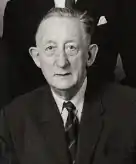George Wigg
George Edward Cecil Wigg, Baron Wigg, PC (28 November 1900 – 11 August 1983) was a British Labour Party politician who only served in relatively junior offices but had a great deal of influence behind the scenes, especially with Harold Wilson.
The Lord Wigg | |
|---|---|
 | |
| Paymaster General | |
| In office 19 October 1964 – 12 November 1967 | |
| Prime Minister | Harold Wilson |
| Preceded by | John Boyd-Carpenter |
| Succeeded by | Judith Hart |
| Member of Parliament for Dudley | |
| In office 5 July 1945 – 30 November 1967 | |
| Preceded by | Cyril Lloyd |
| Succeeded by | Donald Williams |
| Personal details | |
| Born | George Edward Cecil Wigg 28 November 1900 West Ham, East London, England |
| Died | 11 August 1983 (aged 82) Lambeth, South London, England |
| Political party | Labour |
| Spouse |
Florence Veal (m. 1930) |
| Children | 3 |
| Education | Queen Mary's School for Boys, Basingstoke |
| Military career | |
| Allegiance | |
| Service/ | British Army |
| Years of service | 1918–1945 |
| Rank | Colonel |
| Unit | Army Educational Corps (after 1937) Royal Tank Corps (until 1937) |
Background and early career
Wigg was the eldest of six children of Edward William Wigg (1870–1934), of Uxbridge Road, Ealing, manager of a dairy business, and his wife Cecilia (née Comber). Whilst Wigg's mother was extremely industrious, delivering milk alongside doing all the household work, his father was "indolent, disgruntled and lacking ambition" despite his wife's encouragement. On the failure of his own dairy business, Edward Wigg worked for that of his elder brother; George Wigg worked there alongside his father from the age of ten. After years of poor fortunes and having suffered from alcoholism, Edward was found dead in Ewhurst Lake in 1934, near to his birthplace; his son observed: "Why he was at the lake and how he got into it remains a mystery. The coroner recorded a verdict of death by misadventure." Cecilia Wigg subsequently remarried to a soldier.[1][2]
George Wigg was educated at Fairfields Council School and at Queen Mary's Grammar School, both in Basingstoke. Wigg served in the British Army as a regular soldier for almost all his career (from 1918 to 1937)[3] up to his election as the Member of Parliament (MP) for Dudley in 1945. He served in the Royal Tank Corps from 1919 to 1937 and returned to service in the Second World War, being commissioned into the Army Educational Corps in 1940 and serving until 1946 and reaching the rank of colonel. He was Parliamentary Private Secretary to Emanuel Shinwell during the Attlee government.
According to Press Association reporter Chris Moncrieff, Wigg was unpopular with Labour MPs,[4] but managed to use procedure to place the Profumo affair on the record in Parliament, leading to the pursuit of Profumo which ultimately resulted in the latter's resignation. Wigg also played an important part in the aftermath of the failed prosecution of suspected serial killer John Bodkin Adams by questioning in Parliament the unusual conduct of the Prosecution led by Attorney-General, Reginald Manningham-Buller.[5]
In January 1964, Wigg won a High Court action for libel against Angus Maude, a Conservative member. He was represented in court by Alan Orr QC, and substantial damages were awarded.[6]
Paymaster-General; Peerage
Wigg was already known for passing on gossip to Harold Wilson (who had become Labour leader in 1963 on the death of Hugh Gaitskell). When Labour narrowly won the 1964 election Wilson appointed Wigg to the office of Paymaster General. Wigg's responsibilities were many and varied: among them, he was Wilson's link to the Security Service and the Secret Intelligence Service. In November 1967, he was appointed Chairman of the Horserace Betting Levy Board (Wigg loved horse racing) and left Parliament. He was created a life peer on 27 November 1967 taking the title Baron Wigg, of the Borough of Dudley.[7] His resignation from parliament resulted in a by-election in the Dudley seat in early 1968, with the Conservatives gaining the seat before Labour reclaimed it at the general election two years later.
Wigg had been made a Privy Councillor in 1964.
Personal life
In 1930, Wigg married Florence, daughter of William Veal. They had three daughters.[8][9]
References
- George Wigg, Lord Wigg, Michael Joseph, 1972, pp. 18, 20, 24, 25, 32
- "The Oxford Dictionary of National Biography". Oxford Dictionary of National Biography (online ed.). Oxford University Press. 2004. doi:10.1093/ref:odnb/31830. (Subscription or UK public library membership required.)
- Debrett's Peerage and Baronetage, 1980, ed. Patrick Montague-Smith, Debrett's Peerage Ltd, p. 209
- Chris Moncrieff, PA (10 March 2006). "Profumo and Fleet Street | Media". London: MediaGuardian. Retrieved 14 May 2010.
- Cullen, Pamela V., "A Stranger in Blood: The Case Files on Dr John Bodkin Adams", London, Elliott & Thompson, 2006, ISBN 1-904027-19-9
- "Mr. George Wigg, Socialist M.P. for Dudley, is to receive substantial damages for libel from Mr. Angus Maude", in Birmingham Daily Post dated 16 January 1964, p. 18
- "No. 44462". The London Gazette. 28 November 1967. p. 12991.
- Who's who of British Members of Parliament vol. IV, 1945-1979, Michael Stenton, Harvester Press, 1981, p. 395
- George Wigg, Lord Wigg, Michael Joseph, 1972, p. 82
External links
- Hansard 1803–2005: contributions in Parliament by George Wigg
- Catalogue of the Wigg papers at the Archives Division of the London School of Economics.
_(2022).svg.png.webp)